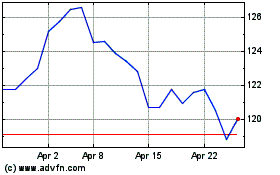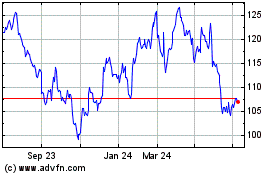By William Boston
BERLIN -- Volkswagen AG will restart car plants across Europe
next week, offering a pandemic-era blueprint for other global
manufacturers that will alter workers' daily lives and, at least
temporarily, relegate productivity to the back seat.
The world's biggest car maker by sales is issuing new manuals to
its global workforce, detailing a list of 100 workplace changes
designed to minimize the risk of coronavirus infections. Workers
will be asked to take their temperatures from home each morning,
change into their factory-floor uniforms before arriving and bring
their own lunch. Carpooling is out.
The changes are so extensive that unions say staff will need
extra time to familiarize themselves with the new practices. "We
have never developed, built or sold cars in these conditions,"
Bernd Osterloh, head of Volkswagen's works council, said in a
statement.
Volkswagen and other global car makers have orchestrated rolling
closures of many of their plants around the world -- first shutting
factories in China, then Europe and North America. The closures
were intended to curb the spread of the virus at the workplace, but
also to deal with collapsing global demand, dealership closures and
the need to virus-proof assembly lines.
Car makers have mostly restarted plants in China, the early
epicenter of the outbreak. New-car sales there plunged when swaths
of the country were quarantined in January and February. But after
factories began to reopen in early March, car production and sales
have started to climb again. It is too early to say how soon, or
whether, demand will fully recover.
Now, manufacturers in Europe are restarting plants, too, and
hoping for a similar boost. The German auto industry, home to one
in 10 manufacturing jobs in Europe, is at the heart of the
continent's efforts to relaunch its economy. By the end of March,
1.1 million of Europe's 2.6 million auto manufacturing workers had
been furloughed, according to the European Automobile
Manufacturers' Association.
Some European car makers have already begun to resume
production. France's Renault SA restarted a plant in Portugal.
Magna Steyr AG, a contract manufacturer, has resumed production of
Mercedes-Benz G-Class sport-utility vehicles. Next week, Daimler
AG's Mercedes will restart production of powertrains at plants in
Berlin, Hamburg and Untertürkheim.
Employees of Volvo Cars, owned by China's Zhejiang Geely Holding
Group, are also returning next week to a vastly different workplace
at the company's plant in Torslanda, Sweden.
"When people arrive on Monday there will be checkpoints at the
entrance where we can check temperature and also blood oxygen
levels," Volvo Chief Executive Hakan Samuelsson said.
Volvo plans to begin working three shifts at its Torslanda plant
starting Monday, but probably only three to four days a week to
achieve about 60% capacity as demand slowly ramps up, Mr.
Samuelsson said.
Volkswagen, meanwhile, is deploying some of the measures it
applied in China, where the new coronavirus emerged. It is also
adding new ones. Many will require workers to reorganize their
daily lives.
The changes begin before workers leave home. To eliminate
crowded changing rooms inside the plant, employees will have to put
on their shop clothes at home before coming to work. Cafeterias
will be closed, so workers will have to bring their own lunches,
which they can eat at their workstation while practicing social
distancing.
In China, returning workers are screened for fever as they
entered the plant. In Europe, workers are being asked to take their
own temperature and go through a checklist of Covid-19 symptoms
before leaving the house each day. Employees are expected to report
any symptoms. The company is also asking workers to refrain from
coming to work in carpools.
Volkswagen will institute buffer periods between changing shifts
to allow one group of workers to leave before the next shift comes
in, to minimize interactions. Workers will enter in a single file,
keeping a distance of 6 feet between each other.
Inside the factory, routes have been remapped to add space
between workers. Wherever the required 6-foot separation cannot be
guaranteed, employees will have to wear face masks. Workers will
also no longer pass material or tools by hand. They will need to
set things down so others can pick them up at a safe distance.
Andreas Tostmann, Volkswagen's global production chief, said
production ramp-up will be gradual. "If necessary, we will produce
less rather than take any risks," he said in an email exchange. "We
won't have the entire workforce back in the early days, but rather
successively increase capacity."
Volkswagen plants would begin operating at about 30% capacity,
gradually building up over weeks, Mr. Tostmann said. He cited the
restart in China, which began slowly in February and March.
Volkswagen's factories in China are now working three shifts and
operate at 60% to 70% of precrisis capacity.
The first European Volkswagen plant to resume operation will be
its factory in Bratislava, Slovakia, which on Monday will switch
the assembly lines back on. The plant builds cars for the company's
Volkswagen, Audi, Porsche, Skoda and SEAT brands.
Then, on Thursday, Volkswagen's electric-vehicle plant in
Zwickau, in eastern Germany, is set to go back online and begin
filling orders for the first 37,000 ID.3 all-electric cars. The
company's main plant in Wolfsburg is set to resume operation on
April 27.
Volkswagen plants in Latin America, Russia and Chattanooga,
Tenn., are expected to follow and will also adopt the new antivirus
regime.
Write to William Boston at william.boston@wsj.com
(END) Dow Jones Newswires
April 17, 2020 12:34 ET (16:34 GMT)
Copyright (c) 2020 Dow Jones & Company, Inc.
Volkswagen (TG:VOW3)
Historical Stock Chart
From Mar 2024 to Apr 2024

Volkswagen (TG:VOW3)
Historical Stock Chart
From Apr 2023 to Apr 2024
